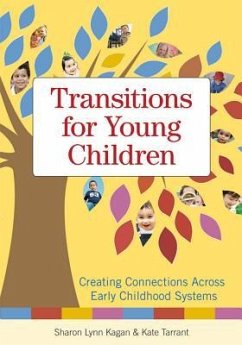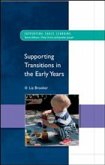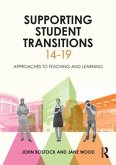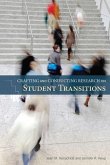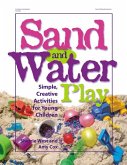Transitions for Young Children
Creating Connections Across Early Childhood Systems
Herausgeber: Kagan, Sharon; Tarrant, Kate
Transitions for Young Children
Creating Connections Across Early Childhood Systems
Herausgeber: Kagan, Sharon; Tarrant, Kate
- Broschiertes Buch
- Merkliste
- Auf die Merkliste
- Bewerten Bewerten
- Teilen
- Produkt teilen
- Produkterinnerung
- Produkterinnerung
A top-notch research volume from leaders in the early childhood education field that reviews exemplary transition strategies and suggests a fresh, new approach to promoting effective vertical, horizontal, and structural transitions for children.;
Andere Kunden interessierten sich auch für
![Supporting Transitions in the Early Years Supporting Transitions in the Early Years]() Liz BrookerSupporting Transitions in the Early Years35,99 €
Liz BrookerSupporting Transitions in the Early Years35,99 €![Transitions to School Transitions to School]() Bob PerryTransitions to School60,99 €
Bob PerryTransitions to School60,99 €![101 Rhythm Instrument Activities for Young Children 101 Rhythm Instrument Activities for Young Children]() Abigail Flesch Connors101 Rhythm Instrument Activities for Young Children14,99 €
Abigail Flesch Connors101 Rhythm Instrument Activities for Young Children14,99 €![Supporting Student Transitions 14-19 Supporting Student Transitions 14-19]() John BostockSupporting Student Transitions 14-1960,99 €
John BostockSupporting Student Transitions 14-1960,99 €![Crafting and Conducting Research on Student Transitions Crafting and Conducting Research on Student Transitions]() Jean M HenscheidCrafting and Conducting Research on Student Transitions7,99 €
Jean M HenscheidCrafting and Conducting Research on Student Transitions7,99 €![Inspiring Spaces for Young Children Inspiring Spaces for Young Children]() Jessica DevineyInspiring Spaces for Young Children31,99 €
Jessica DevineyInspiring Spaces for Young Children31,99 €![Sand and Water Play Sand and Water Play]() Sherrie WestSand and Water Play13,99 €
Sherrie WestSand and Water Play13,99 €-
-
-
A top-notch research volume from leaders in the early childhood education field that reviews exemplary transition strategies and suggests a fresh, new approach to promoting effective vertical, horizontal, and structural transitions for children.;
Hinweis: Dieser Artikel kann nur an eine deutsche Lieferadresse ausgeliefert werden.
Hinweis: Dieser Artikel kann nur an eine deutsche Lieferadresse ausgeliefert werden.
Produktdetails
- Produktdetails
- Verlag: Brookes Publishing Company
- All Young Children. edition
- Seitenzahl: 360
- Erscheinungstermin: 10. September 2010
- Englisch
- Abmessung: 256mm x 180mm x 18mm
- Gewicht: 612g
- ISBN-13: 9781598570830
- ISBN-10: 1598570838
- Artikelnr.: 30513252
- Herstellerkennzeichnung
- Libri GmbH
- Europaallee 1
- 36244 Bad Hersfeld
- gpsr@libri.de
- Verlag: Brookes Publishing Company
- All Young Children. edition
- Seitenzahl: 360
- Erscheinungstermin: 10. September 2010
- Englisch
- Abmessung: 256mm x 180mm x 18mm
- Gewicht: 612g
- ISBN-13: 9781598570830
- ISBN-10: 1598570838
- Artikelnr.: 30513252
- Herstellerkennzeichnung
- Libri GmbH
- Europaallee 1
- 36244 Bad Hersfeld
- gpsr@libri.de
Sharon Lynn Kagan, Ed.D., Virginia and Leonard Marx Professor of Early Childhood and Family Policy and Co-director of the National Center for Children and Families, Teachers College, Columbia University, 525 West 120th Street, Box 226, New York, New York 10027. Dr. Kagan is Professor Adjunct at Yale University's Child Study Center. Through her leadership in the field and her 15 books and 250 articles, Dr. Kagan has helped shape early childhood practice and policies in the United States and in countries throughout the world. Kate Tarrant, M.P.A., Graduate Research Fellow, National Center for Children and Families, Teachers College, Columbia University, 525 West 120th Street, Box 226, New York, New York 10027. Kate Tarrant is a doctoral candidate in Curriculum and Teaching, concentrating on early childhood policy. As a graduate research fellow at the National Center for Children and Families (NCCF), Teachers College, Columbia University, Ms. Tarrant works on the National and International Transitions analysis and the Policy Matters Project. In addition, she worked on the Early Care and Education Workforce Initiative and previously served as the Assessment Coordinator for the NCCF project with New York Cityâ (TM)s Administration for Childrenâ (TM)s Services to develop, field test, and evaluate a unified quality assessment tool for early care and education programs in New York City. Her research interests include the application of early care and education policy to practice in different types of early learning settings. She is also interested in the development of comprehensive and inclusive early childhood systems. Ms. Tarrant earned her masterâ (TM)s degree in public administration at Columbia Universityâ (TM)s School of International and Public Affairs, with a concentration in social policy. She has been a consultant for New York Cityâ (TM)s Administration for Childrenâ (TM)s Services Division of Child Care and Head Start. Previously, she worked as the public policy specialist for Good Beginnings Alliance- Hawaii, an early childhood intermediary organization. Jeanne Brooks-Gunn, Ph.D., Virginia and Leonard Marx Professor of Child Development and Education, Teachers College and College of Physicians and Surgeons, Columbia University, 525 West 120th Street, Box 39, 254 Thorndike, New York, New York 10027. Dr. Brooks-Gunn directs the National Center for Children and Families (http: //www.policyforchildren.org). She is interested in factors that contribute to both positive and negative outcomes across childhood, adolescence, and adulthood, with a particular focus on key social and biological transitions over the life course. Richard M. Clifford, Ph.D., has training in educational administration with specializations in political science and research. He has taught and has served as a principal in public schools. For more than 25 years, he has studied public policies and advised government officials and practitioners on policies affecting children and families. His work focuses on two major areas: public financing of programs for young children and the provision of appropriate learning environments for preschool and early school-age children. Dr. Clifford is co-author of a widely used series of instruments for evaluating learning environments for children, including the Family Day Care Rating Scale (FDCRS; Teachers College Press, 1989), co-authored with Thelma Harms, and the Infant/Toddler Environment Rating Scale (ITERS; Teachers College Press, 1990) and the Early Childhood Environment Rating Scale0-Revised Edition (ECERS-R; Teachers College Press, 1998), both co-authored with Thelma Harms and Debby Cryer. In 1993-1994, Dr. Clifford helped establish and served as the first director of the Division of Child Development in the North Carolina Department of Human Resources and helped with the design and implementation of the state's Smart Start early childhood initiative. He is a past president of the National Association for the Education of Young Children (NAEYC). Jocelyn Friedlander, Research Assistant, National Center for Children and Families, Teachers College, Columbia University, 525 West 120th Street, Box 226, New York, New York 10027. Ms. Friedlander received her bachelor of arts degree from Yale University. Robert C. Pianta, Ph.D., is Dean of the Curry School of Education, Director of the Center for Advanced Study in Teaching and Learning and Novartis U.S. Foundation Professor of Education at the University of Virginia, Charlottesville. A former special education teacher, Dr. Pianta is a developmental, school, and clinical child psychologist whose work focuses on assessment and improvement of teacher-student interactions and their role in fostering children's learning and development. Dr. Pianta is a principal investigator on several major grants including the National Center for Research in Early Childhood Education and the Virginia Education Sciences Training Program, and he has worked closely with the Gates Foundation-funded Measure of Effective Teaching project. He is the author of more than 250 journal articles, chapters, and books in the areas of early childhood education, teacher performance assessment, professional development, and teacher-child relationships, and he consults regularly with federal agencies, foundations and universities. Craig Ramey, Ph.D., is the creator and founding director of the Abecedarian Project and its replicants including Project CARE and the Infant Health and Development Program. His program of research centers on the role of early experience, especially education â " across the human lifespan - in the development of competence and robust health. His approach relies largely on experimental interventions in education, psychology, and pediatrics that provide rigorous tests of plausible developmental mechanisms of stability and change within dynamic, multilevel ecologies.

